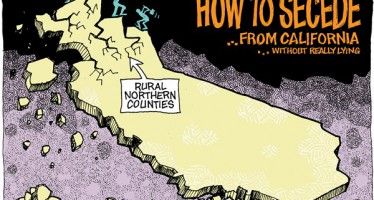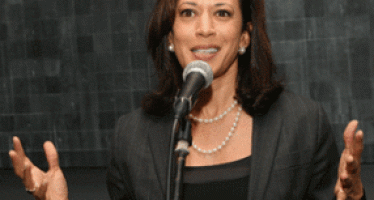SB 1 pushes high-rises over suburbs

Will the Manhattan Dream replace the California Dream? The Manhattan Dream is to live in a high-rise in a densely packed city. The California Dream is to live your own home, on your own lot so you can grill while your kids are playing in your yard.

Pushing people into high rises is the goal of Senate Bill 1, the Sustainable Communities Investment Authority bill by Senate President Pro Tem Darrell Steinberg, D-Calif. Term limited out of office next year, it’s a key piece of the legacy he hopes to leave behind for California. SB 1 will be heard in the Assembly Local Government Committee Wednesday, Aug. 14 at 1:30 p.m.
It follows Steinberg’s SB 375, the Preferred Growth Scenario bill, which then-Gov. Arnold Schwarzenegger signed into law in 2008. Along with Schwarzenegger’s better-known AB 32, the California’s Global Warming Solution Act of 2006, SB 375 was a keystone in the Steinberg-Schwarzenegger blueprint for a green, “sustainable” California of high rises.
The Preferred Growth Scenario requires all transportation plans and funds in the state must pack an absolute minimum of 10 families into an acre land. SB 375 basically means the state of California, by law, officially is pushing people out of single-family homes and into high-rises.
“Welcome to the brave new world of central planning,” then state Sen. Tom McClintock said back in 2008. “The denser the better.”
SB 1
The new bill, SB 1, advances that central state plan. SB 1 resembles failed ballot initiative Proposition 31, which voters defeated in November last year, 61-39. As CalWatchdog.com’s Wayne Lusvardi was the first to reveal, Prop. 31 could have authorized “the state to withhold or divert taxes from local governments unless those governments adopted a ‘Strategic Action Plan’ to distribute the revenues from the suburbs to the large urban cities.”
Such tax sharing actually means redistribution.
SB 1 would set up the Sustainable Communities Investment Authority, which would be a new state agency effectively implementing Prop. 31’s Strategic Action Plan.
Redevelopment 2.0
SB 1 would authorize both bonds and more taxes to fund these ”sustainable communities.”
In 2011, Gov. Jerry Brown and the Legislature eliminated redevelopment to take the $1.5 billion a year being spent on it. Redevelopment originally was supposed do mean clearing “blighted” areas. But it ended up being used to seize middle-class homes and businesses to give the property to influential developers of Big Box commercial areas.
Such abuse could return under SB 1, which is why it’s being dubbed “Redevelopment 2.0.” According to bill analysis, it would authorize certain public entities of a Sustainable Communities Investment Area to form a Sustainable Communities Investment Authority to carry out the Community Redevelopment Law, consistent with the state’s restrictions on sustainable development.
The United Food and Commercial Workers union praises SB 1 as giving “cities and counties a modest tool to support sustainable economic development that creates good jobs, affordable housing and a healthy environment.”
But as with the old kind of redevelopment, much of this SB 1 development of transit priority areas, clean manufacturing districts and small “walkable communities” will be funded through tax increment financing.
“Tax increment financing is an alluring tool that allows municipalities to promote economic development by earmarking property tax revenue from increases in assessed values within a designated TIF district,” according to the Lincoln Institute of Land Policy. Proponents claim assessed property value within TIF districts grows much faster than in the rest of the municipality. But the Lincoln Institute found TIF areas grow no more rapidly, and perhaps grow more slowly, and “commercial TIF districts tend to decrease commercial development in the non-TIF portion of the municipality.”
Tax increment financing also would be authorized to support High-Speed Rail stations and related infrastructure.
Other bills
The outcome of SB 1 may be tied to a number of other bills on redevelopment. Some of the bills are new, and others are similar to redevelopment bills Brown vetoed last year:
* SB 33 by Sen. Lois Wolk, D-Davis, makes it easier for local governments to form infrastructure financing districts. A similar measure, SB 214, was vetoed by Brown last year.
* SB 391 by Sen. Mark DeSaulnier, D-Concord, would generate $500 million in affordable housing funds.
* AB 294 by Assemblyman Chris Holden, D-Pasadena, directs the California Infrastructure and Economic Development Bank to work with local government on transit-oriented development and affordable housing projects. And it would allow an infrastructure financing district to use the Educational Revenue Augmentation Fund portion of incremental tax revenue.
* AB 229 by Assembly Speaker John Perez, D-Los Angeles, would expand types of local projects that are financed by existing infrastructure financing districts. Brown vetoed the similar AB 2144 in September.
* AB 243 by Roger Dickinson, D-Sacramento, would authorize new redevelopment districts, and the issuance of debt for those areas with only 55 percent of the vote, instead of the two-thirds currently required.
Related Articles
Clean air farce is now just a tax
Oct. 4, 2012 By Katy Grimes After several years of complying with the goals of AB 32, California’s business community
Harris tempts challengers with ‘blood sport’ politics
Attributing her success to a “blood sport” view of politics, California Attorney General Kamala Harris has established herself as the leading contender to




